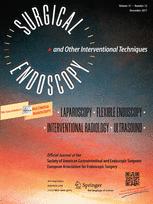Cahan MA, Balduf L, Colton K, Palacioz B, McCartney W, Farrell TM
Surg Endosc. 2006 Sep;20(9):1364-7.
BACKGROUND:
In the authors’ previous study of gallbladder function before and after fundoplication, 58% of the patients demonstrated preoperative gallbladder motor dysfunction, and 86% of those retested after operation and cessation of proton pump inhibitors (PPIs) normalized. Because no study has directly assessed the impact of antisecretory agents on gallbladder function, this study measured gallbladder ejection fraction (GBEF) in healthy volunteers before and after initiation of PPIs.
METHODS:
A total of 19 subjects completed the study, which included baseline determination of GBEF by cholecystokinin-stimulated hepatobiliary acid scan, 30 days of antisecretory therapy with omeprazole (40 mg daily), and repeat GBEF on day 30. Subjects were surveyed regarding compliance and symptoms.
RESULTS:
For 15 of 19 subjects, PPI therapy was associated with reduced gallbladder motility. Evolution of symptoms consistent with a biliary etiology was reported by 26.7% of these subjects.
CONCLUSIONS:
Short-term PPI therapy reduces gallbladder motility in healthy volunteers. Chronic PPI therapy may pose a risk for long-term gallbladder dysfunction and biliary complications.
Link to abstract on PubMed: Cahan MA, et al; Surg Endosc. 2006 Sep;20(9):1364-7.


